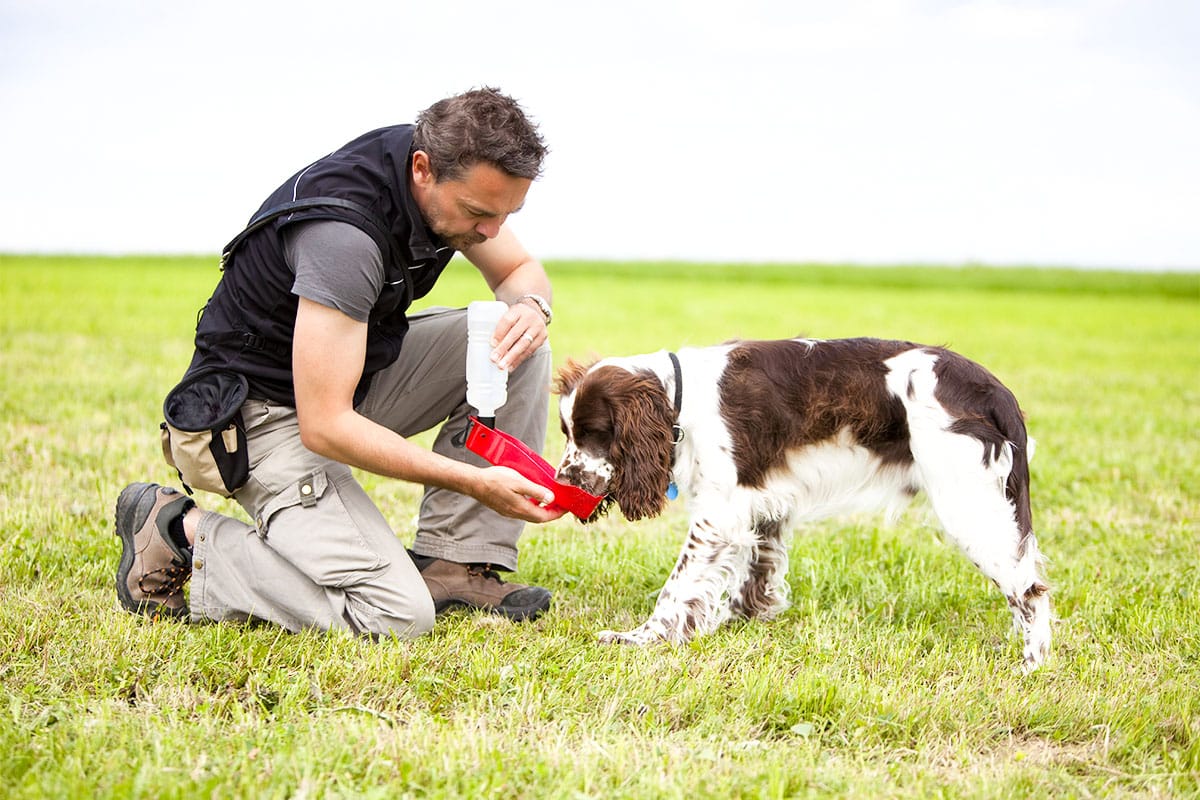Dogs are an important part of your family and their health is your responsibility. About 70% of American households have a pet. Caring for their intestinal health is important to ensure their overall well-being.
Just like humans, the GI tract of dogs contains various microorganisms that are crucial to maintaining homeostasis. When there is a disruption in this balance, it can cause several health issues. The probiotics for dogs are supplements that help restore the gut microbiota in pets. This blog explores how probiotics can help with dogs’ gut health and the importance of giving probiotics to dogs.
What are Probiotics for Dogs?
The beneficial bacteria that live in the gastrointestinal tract of humans and animals is called probiotics. Probiotics for dogs refer to supplements that provide these good bacteria. It helps dogs restore gut microbiota.
The GI microbiome is important for digestive wellness and overall immunity. Only a healthy gut can help your dog absorb vitamins and minerals from its diet.
Signs Your Dog Needs Probiotics
Changes in the gut microbiome can disrupt the balance and cause many issues for your pet. While your dog can’t tell you that something is upsetting them, they may show some signs that indicate that probiotics can be helpful. If you notice these signs, you may consider buying probiotics for dogs:
- Digestive Issues: Problems in digestion can be resolved with probiotics. You can consider giving probiotics to dogs when you notice diarrhea or loose stools, constipation, excessive flatulence, gurgling sounds in the stomach, vomitting, changes in the dog’s appetite.
- Skin and Coat Issues: Probiotics can also help improve skin and coat health in dogs. They may be added to your dog’s diet if you see your dog constantly itching, and scratching, dull coat, excessive shedding, dry and flaky skin.
- Recurrent ear infections: Allergies and imbalances in the gut can be the reason why your dog is getting ear infections. It can be relieved with the use of probiotics.
- Bad breath: Does your dog have foul breath even though you regularly brush its teeth? It may be due to digestive issues and probiotics can be given.
- Weight Loss: If your dog is losing weight and you don’t know why, it may be due to poor nutrient absorption due to gut imbalance. Try giving probiotics to help your dog gain a healthy weight.
- Behavioral changes: Stress and anxiety impact mood and behavior in dogs. If your dog is showing significant changes in behavior and expressing anxiety, probiotics can help soothe and calm them.
What do Probiotics Do for Dogs?
Probiotics have many therapeutic properties for gut health in dogs. They can be useful in relieving symptoms associated with IBD, diarrhea, allergy, etc. Particular strains like Helicobacter and Lactobacillus are especially good for the gut of dogs.
The microbiota diversity may be affected in dogs with intestinal inflammation. The probiotics for dogs provide the beneficial bacterial strains to restore the gut microbiota. They also support the integrity of the epithelial layer and influence the immune system.
Healthy dogs generally have a balanced gut microbiome. However, during illness, stress, or while taking other medications, your dogs may need additional pet supplements to support their well-being. You must consult with your vet to determine whether your dog needs probiotics.
Pre and Probiotics for Dogs
Prebiotics for dogs contain nondigestible dietary fiber. These feed the probiotic bacteria. These prebiotics are naturally present in fruits and vegetables and they are also available as prebiotic supplements.
What are the Benefits of Probiotics for Dogs?
Some of the benefits of probiotics for dogs are:
- Support the immune system
- Improves intestinal inflammation
- Helps with diarrhea in dogs
- Reduces allergic reactions
When Should I Give Probiotics for Dogs?
Generally, veterinarians recommend giving probiotics to dogs during the following conditions:
- Recovering from an illness or infection
- When dogs are under stress due to moving, traveling, etc.
- Changes in diet
- Upset stomach
- Old age of dogs
- When taking medications like antibiotics
Can Dogs Take Probiotics for Humans?
Humans and dogs don’t have the same gut flora. The beneficial bacteria and their proportions vary in the gut of humans and dogs. So, you should not give probiotics designed for humans to dogs. Moreover, the concentration of live strains in human probiotics are far higher than the concentrations suitable for dogs. Thus, to ensure the right dosage, delivery, and safety, choose probiotics exclusively formulated for dogs.
Do Probiotics Help with Diarrhea?
One of the most common reasons why pet owners look for probiotics for dogs is diarrhea. For puppies, something as simple as going to the training centre can cause stress and result in diarrhea. Sometimes, changes in diet or ingesting something they shouldn’t can result in diarrhea.
Probiotics for dogs are useful in restoring the gut balance and they can help reduce diarrhea symptoms. Look for strains like Enterococcus faecium or Bacillus coagulans, which are known to ease GI distress in dogs.
Can a Probiotic Help My Dog With Itching?
Often, itching in dogs is caused by allergies, parasites, or skin diseases. Probiotics help strengthen the immune system in dogs and they can help with controlling the itching. Studies show that probiotics can be helpful in relieving symptoms of canine atopic dermatitis (cAD)
What You Should Know Before Giving the Best Probiotics to Dogs?
While probiotics for dogs are beneficial, consider the following before choosing probiotic supplements for dogs:
- Your dog’s health: Healthy dogs don’t always need a probiotic supplement. You can ask your vet about whether it’s useful to add it to your dog’s diet.
- Watch the diet: Dogs who eat more carbohydrates may not have a healthy microbiome. Include more protein in your dog’s food and get help from your vet to find the right diet for your dog. A probiotic supplement can be useful in increasing the number of beneficial bacteria in the gut.
- Verify before giving human foods: Some pet owners give yogurt or kefir to dogs as probiotics. Read the labels carefully and ensure that they don’t contain artificial sweeteners or preservatives. It’s best to offer probiotics designed for dogs to avoid any kind of stomach discomfort.
How to Choose Probiotics for Dogs?

Ask the following questions before you buy probiotics for dogs:
- How many CFUs are there? Ensure that the probiotics you choose for your dog are formulated exclusively for pets. Currently, the recommendation is that you can give probiotics with 1-10 billion colony-forming units (CFUs) for dogs.
- Will it benefit my dog? Pet probiotics are specifically designed to contain strains of bacteria that are beneficial for them. Read the label to see if it contains Lactobacillus, Bifidobacterium strains of bacteria. If you are choosing probiotics for specific issues like diarrhea, anxiety, stool quality, etc, look for specific strains like Bifidobacterium animalis (strain AHC7), Bifidobacterium longum (BL999), Lactobacillus acidophilus, respectively.
- Will it suit my dog? Choose probiotics designed for the dog you have. You can find specific probiotics for large and small dogs. Some probiotics, like Dr. Mercola Complete Probiotics, are suitable for both cats and dogs and the dosage varies based on the size and weight of the dog.
- Will my dog eat it? Probiotics for dogs are available in capsules, powder, and chewable forms. Choose a form that’s easy to give to your dogs. If your dog can eat capsules and chewables, you can give them directly by mouth. For picky eaters, you can open the capsule or use powder probiotics and mix them with dry or wet food. You can also hide them in their favorite treat, like peanut butter.
- Is it safe for my dog? Learn about the brand you choose and whether the products are thoroughly tested for safety and efficacy for pets. Brands like Dr Mercola, Terry Naturally, Rx Vitamins for Pets, etc, have good market reputation and are well-trusted by experts and healthcare professionals. You can find curated products from such brands on Nutriessential.
- Is it stable on the shelf? The probiotics contain live cultures and they need to be stored in the right way to preserve them. Follow the instructions on the package and store them in the right way in a cool, dry place.
Frequently Asked Questions on Pet Probiotics
- What is a good probiotic for dogs?
A good probiotic for dogs contains high colony-forming units (CFUs) and contains bacterial strains suitable for dogs. Consult your vet for the best probiotic suitable for your dog.
- Are there side effects of giving probiotics to dogs?
As the probiotics change the gut flora and increase the number of bacteria, mild digestive issues are expected. Bloating or changes in stool are more common until your dog’s body adjusts itself to the probiotics. This often resolves quickly in a few days. If your dog has more severe side effects, consult your vet.
- Is pumpkin a probiotic for dogs?
Pumpkin is not a probiotic. Many dog owners find that it’s helpful for dogs with diarrhea. It’s rich in fiber. Pumpkin, however, contains prebiotics that can feed probiotic bacteria.
- Can I use probiotics if my dog is healthy?
Yes, probiotics may be useful to improve the gut microbiome in healthy dogs. Especially when you know that there’s going to be a change in the dog’s routine, such as moving, traveling, or periods of stress, you can give them probiotics to improve their immune resilience. For long-term use, consult with your vet.
- Where can I buy probiotics for dogs?
Probiotics are useful to improve dogs’ gut health, but only if you choose the right formulation. Your vet can suggest probiotics best suited for your dog. You can also buy probiotics for dogs online from reputable stores like Nutriessential. When you buy online, always choose the right sources to ensure that you get genuine products with quality assurance.
References:
- Cormanes, A., & Cormanes, A. (2024, February 4). 10 signs your dog needs probiotics. Honest Paws./blogs/probiotics/how-do-i-know-if-my-dog-needs-probiotics
- Davis, S. (2025, April 24). Probiotics for dogs: Foods and supplements. WebMD. https://www.webmd.com/pets/dogs/foods-with-probiotics-for-dogs
- Dr Aditi, MDS, Certified Dietary Supplement Advisor. How to Choose the Right Vitamins and Supplements for Your Pet. Nutriessential.com
- Manucy, T., DVM. (2024, November 27). Probiotics for dogs: Do they work?
- Staff, A. (2024, May 30). Probiotics for dogs. American Kennel Club. .akc. org/expert-advice/nutrition/probiotics-for-dogs/
- Xu, H., Huang, W., Hou, Q., Kwok, L., Laga, W., Wang, Y., Ma, H., Sun, Z., & Zhang, H. (2019). Oral administration of compound probiotics improved canine feed intake, weight gain, immunity and intestinal microbiota. Frontiers in Immunology, 10. doi .org /10.3389/fimmu.2019.00666
- Yang, Q., & Wu, Z. (2023). Gut probiotics and Health of Dogs and cats: benefits, applications, and underlying mechanisms. Microorganisms, 11(10), 2452. https: //doi. org/ 10.3390 /microorganisms11102452




















 English (US) ·
English (US) ·